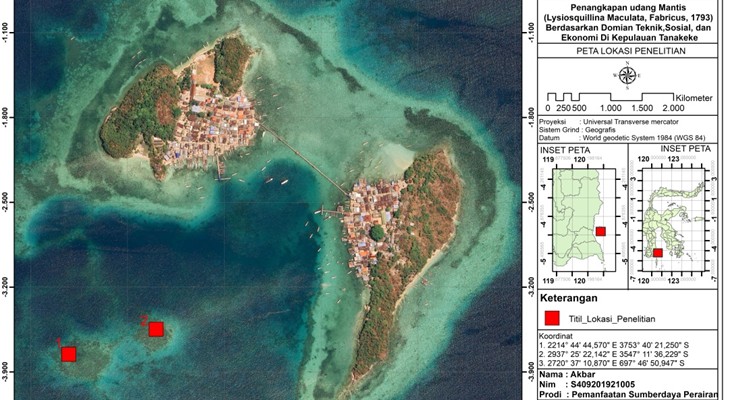Akuatikisle: Jurnal Akuakultur, Pesisir dan Pulau-Pulau Kecil
Full Length Article
Catching of mantis shrimp (Lysiosquillina maculata) by fishermen of Tanakeke Islands based on Technical Domains
Highlights
Generate NLP AI by Wizdam ID.
Abstract
Mantis shrimp (Lysiosquillina maculata Fabricus, 1793) is a type of marine crustacean that has high nutritional content, especially protein, so it is quite in demand by the international community as a consumption ingredient. Mantis shrimp is an interesting species because it has true economic and ecological value. The development of mantis shrimp fisheries in the Tanakeke Islands and Kanalo Islands can provide broad benefits, both in terms of economy and social. Ecosystem Approach to Fisheries Management is here to realize fisheries management that balances socio-economic aspects and the utilization of fish resources fairly, with knowledge, information, and uncertainty regarding biotic, abiotic components, and human interactions in aquatic ecosystems to realize integrated, comprehensive, and sustainable fisheries management. This study aims to examine the capture of mantis shrimp Based on EAFM in the Fishing Technique Domain. This study is classified as mixed methods according to the indicators set for the Fishing Technique domain, namely the frequency of violations over the past five years; Catching; area of fishing area, and duration of fishing; legal documents of the fishing fleet; and fishing vessel crew certificates. The selection of research respondents was based on purposive sampling. The condition of the mantis shrimp fishery according to the Ecosystem Approach to Fisheries Management (EAFM) approach shows an aggregate value of 290 which produces a Domain value of 93.55. This value is included in the model category with a Dark Green flag, which indicates that the implementation of EAFM is at a very good level.
Keywords
Introduction
Section snippets
Material and Methods
Materials and methods from the full-text PDF of this article cannot be displayed.
Results
Results from the full-text PDF of this article cannot be displayed.
Discussion
Discussion from the full-text PDF of this article cannot be displayed.
Conclusions
Conclusions from the full-text PDF of this article cannot be displayed.
Acknowledgment
Acknowledgment from the full-text PDF of this article cannot be displayed.
Funding Information
Kementerian Pendidikan, Kebudayaan, Riset, dan Teknologi Republik Indonesia Tahun 2024
Competing interest
The authors declare that they have no known competing financial interests or personal relationships that could have appeared to influence the work reported in this paper.
Conflict of interest
The authors declare that the research was conducted in the absence of any commercial or financial relationships that could be construed as a potential conflict of interest.
Ethical approval acknowledgements
No ethical approval required for this article. All procedures followed were in accordance with the ethical standards of the responsible committee on human experimentation (institutional and national) and with the Helsinki Declaration of 1975, as revised in 2008 (5)
Data availability
All the data have been provided via Supplementary files. Any further information can be requested from the corresponding author via email upon reasonable request.
Appendix. Supplementary materials
Supplementary File 1: Catching of Mantis Shrimp (Lysiosquillina maculata) by Fishermen of Tanakeke Islands based on Technical Domains (Research Instrument)
Declarations information
License and permission
 This work is licensed under a Creative Commons Attribution-ShareAlike 4.0 International License (https://creativecommons.org/licenses/by-sa/4.0), which permits use, sharing, adaptation, distribution and reproduction in any medium or format, as long as you give appropriate credit to the original author(s) and the source, provide a link to the Creative Commons licence, and indicate if changes were made. The images or other third party material in this article are included in the article's Creative Commons licence, unless indicated otherwise in a credit line to the material. If material is not included in the article's Creative Commons licence and your intended use is not permitted by statutory regulation or exceeds the permitted use, you will need to obtain permission directly from the copyright holder.
This work is licensed under a Creative Commons Attribution-ShareAlike 4.0 International License (https://creativecommons.org/licenses/by-sa/4.0), which permits use, sharing, adaptation, distribution and reproduction in any medium or format, as long as you give appropriate credit to the original author(s) and the source, provide a link to the Creative Commons licence, and indicate if changes were made. The images or other third party material in this article are included in the article's Creative Commons licence, unless indicated otherwise in a credit line to the material. If material is not included in the article's Creative Commons licence and your intended use is not permitted by statutory regulation or exceeds the permitted use, you will need to obtain permission directly from the copyright holder.
Publisher's Note
Sangia Publishing remains neutral with regard to jurisdictional claims in published maps and institutional affiliations.
References (25)
Ahyong. (2012). Mantis Shrimps (Crustcea: Stomatopoda). Niwa Taihoro Nukurangi. Diakses 8 Januari 2025, https://docs.niwa.co.nz/library/public/Memoir%20125_The%20Marine%20Fauna%20of%20New%20Zealand_Mantis%20Shrimps.
Amir, W., Razak, D., Fahrizal, A., & Inayah, I. (2019). Penentuan Status Pengelolaan Perikanan Udang Pada Domain Kelembangaan Dengan Pendekatan Eafm Di Kabupaten Sorong Selatan Provinsi Papua Barat. Jurnal Riset Perikanan Dan Kelautan, 1(2), 110–123.
BPS Sulsel. (2024). Produksi dan Nilai produksi Perikanan Tangkap Menurut Kabupaten/Kota dan jenis Penangkapan di Provinsi Sulawesi selatan, 2022. Diakses 6 Mei dari https://sulsel.bps.go.id/id/statistics-table/3/TlRkSE0xQmlRWEpYVUhBeVVVTm9NWE5hYmtSd1p6MDkjMw==/produksi-dan-nilai-produksi-perikanan-tangkap-menurut-kabupaten-kota-dan-jenis-penangkapan-di-provinsi-sulawesi-selatan--2019.html?year=2022
Chamalia, D. A. (2023). TA: Pembenihan Udang Vaname (Litopenaeus vannamei, Boone 1931). Politeknik Negeri Lampung.
Dimenta, R. H., Machrizal, R., & Khairul, K. (2019). Informasi Morfologi Reproduksi Dan Nisbah Kelamin Udang Mantis Cloridopsis scorpio (Latreile, 1828) Di Perairan Ekosistem Mangrove Belawan. Jurnal Pembelajaran Dan Biologi Nukleus, 5(2), 24–33.
Fahrizal, A., Razak, A. D., Shafua, A. M., & Irwanto, I. (2020). Manajemen Perikanan Udang Dengan Pendekatan Eafm Pada Domain Habitat Dan Ekosistem Di Kabupaten Sorong Selatan Provinsi Papua Barat. Jurnal Riset Perikanan Dan Kelautan, 2(2), 197–211.
Hasibuan, S. A. D., & Dimenta, R. H. (2022). Aspek Reproduksi Udang Mantis Harpiosquilla Raphidea Di Ekosistem Mangrove Kabupaten Labuhanbatu, Sumatera Utara. Jurnal Biolokus: Jurnal Penelitian Pendidikan Biologi Dan Biologi, 5(1), 24–34.
Kondjol, S., Boli, P., & Toha, A. H. A. (2020). Penilaian domain pengelolaan perikanan udang jerbung (Penaeus merguiensis) berbasis ekosistem di Kabupaten Sorong Selatan. Jurnal Ilmu Kelautan Kepulauan, 3(2). DOI: https://doi.org/10.33387/jikk.v3i2.2583
Maulana, Z. G. (2020). Hubungan Hasil Tangkapan Udang Mantis Harpiosquilla raphidea dengan Karakteristik Sedimen Habitat di Perairan Pesisir Banyuasin Sumatera Selatan. Doctoral dissertation Sriwijaya University]. https://repository. unsri. ac ….
Naibaho, D. R. G. (2022). Perbandingan hasil tangkapan udang mantis (Harpiosquilla raphidea) dengan menggunakan alat tangkap gill net di perairan mendahara iliri kabupaten tanjung jabung timur. Universitas Jambi.
National Working Group Indonesia on Ecosystem Approach to Fisheries Management. (2014). Indkator Untuk pengelolaan perikanan dengan pendekatan Ekosistem, EAFM, Di akses dari www.eafm-indonesia.net.
Pamungkas, M. A. (2023). Perbandingan Hasil Tangkapan Udang Mantis (Harpiosquilla raphidea) dengan Umpan yang Berbeda di Desa Sungai Jambat Kabupaten Tanjung Jabung Timur. Pemanfaatan Sumberdaya Perikanan.
Perhubungan, D. (2005). Peraturan Pemerintah Nomor 7 Tahun 2000 Tentang Kepelautan. Peraturan Perundangan Bidang Transportasi. Jakarta.
Purwanto, P. (n.d.). Angka Acuan Batas Pemanfaatan Stok Udang dan Ikan Demersal di Laut Arafura. Jurnal Penelitian Perikanan Indonesia, 20(1), 53–61.
Ramdhani, F., Heltria, S., Magwa, R. J., Ramadan, F., Nofrizal, N., & Jhonnerie, R. (2022). Karakteristik Dimensi Utama Kapal Gillnet (Static Gear) Pada Penangkapan Udang Mantis (Harpiosquilla Raphidea) Di Kampung Nelayan, Jambi. Akuatika Indonesia, 7(2), 80–86.
Ramdhani, F., Nofrizal, N., & Jhonnerie, R. (2019). Studi hasil tangkapan bycatch dan discard pada perikanan udang mantis (Harpiosquilla raphidea) menggunakan alat tangkap gillnet. Marine Fisheries: Journal of Marine Fisheries Technology and Management, 10(2), 129–139.
Rombe, K. H., Wardiatno, Y., & Adrianto, L. (2018). Management of lobster fishery with EAFM approach in Palabuhanratu bay. Jurnal Ilmu Dan Teknologi Kelautan Tropis, 10(1), 231–241.
Situmeang, N. S., Purnama, D., & Hartono, D. (2017). Identifikasi spesies udang mantis (Stomatopoda) di perairan Kota Bengkulu. Jurnal Enggano, 2(2), 239–248.
Sularso, A. (2005). Alternatif pengelolaan perikanan udang di Laut Arafura. Disertasi (Tidak Dipublikasikan). Sekolah Pascasarjana Institut Pertanian Bogor. Bogor, 130.
Suman, A., Lestari, P., & Damora, A. (2021). Pengelolaan Udang Mantis (Harpiosquilla raphidea) Di Perairan Tanjung Jabung Barat Dan Sekitarnya, Jambi. Jurnal Kebijakan Perikanan Indonesia, 13(1), 43–58.
Suman, A., & Satria, F. (2014). Opsi pengelolaan sumberdaya udang di Laut Arafura (WPP 718). Jurnal Kebijakan Perikanan Indonesia, 6(2), 97–104.
Sumiono, B. (2012). Status sumberdaya perikanan udang penaeid dan alternatif pengelolaannya di Indonesia. Jurnal Kebijakan Perikanan Indonesia, 4(1), 27–34.
Tajuddin, M., Tang, B., & Saenong, M. (2021). Hubungan Jarak Lokasi Penangkapan Terhadap Hasil Tangkapan Dan Distribusi Frekwensi Ukuran Rajungan Di Perairan Kabupaten Pangkep. Journal of Indonesian Tropical Fisheries (Joint-Fish): Jurnal Akuakultur, Teknologi Dan Manajemen Perikanan Tangkap Dan Ilmu Kelautan, 4(2), 251–260.
Wedjatmiko, W. (2017). Sebaran dan Kepadatan Udang Mantis (Carinosquilla spinosa) di Perairan Arafura. Jurnal Penelitian Perikanan Indonesia, 13(1), 61–69.
Wibowo, B. A., Aiman, A. M. A., & Setyawan, H. A. (2021). Strategi Pengembangan Komoditas Unggulan Perikanan Tangkap di Kabupaten Sinjai. Journal of Marine Research, 10(4), 481–492.
Bibliographic Information
Cite this article as:
-
Submitted
10 May 2025 -
Revised
15 June 2025 -
Accepted
20 July 2025 -
Published
24 July 2025 -
Version of record
9 September 2025 -
Issue date
30 November 2025
-
Academic subject
Aquaculture; Fisheries Sciences
Copyright
Sangia Advertisement
Copyright © 2025 Akbar, SRI WULANDARI. Sangia Research Media and Publishing. Production and hosting by Sangia (SRM™).  This work is licensed under a Creative Commons Attribution-ShareAlike 4.0 International License.
This work is licensed under a Creative Commons Attribution-ShareAlike 4.0 International License.
Disclaimer: All claims expressed in this article are solely those of the authors and do not necessarily represent those of their affiliated organizations, or those of the publisher, the editors and the reviewers. Any product that may be evaluated in this article or claim that may be made by its manufacturer is not guaranteed or endorsed by the publisher.
Comments on this article
By submitting a comment you agree to abide by our Terms and Community Guidelines. If you find something abusive or that does not comply with our terms or guidelines please flag it as inappropriate.









